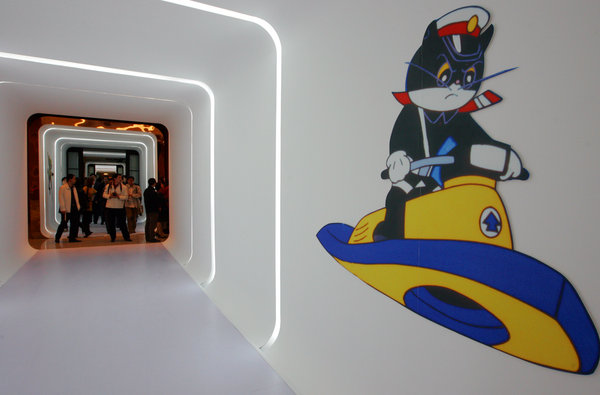Chinese animation labeled 'creative' money
 |
|
A poster of the famous Chinese animation "The Black Cat Sheriff" displayed on the exhibition [CFP] |
Cai Wu, minister of culture, said Chinese animation and comic arts were attracting more attention than ever in the country with unprecedented opportunities ahead.
"After so many years of accumulation, Chinese animation has been fully fledged for a take-off," said Liao.
He owed the growth to the governmental support and dissemination work.
He said Chinese government had been fully aware of the value of creative works of traditional culture and is trying to find a more effective way to communicate those values to its young people.
"We should look at the animation industry in a new way," said Ouyang Jian, vice minister of culture. "It's an industry which can bring happiness and dreams to people, especially for the adolescent."
Wang Jingtian, 19, an animation major with a vocational school in Beijing, said he had the feeling that his job prospects becomes brighter.
He is also a cartoon fan and used to read manga in primary school parks between classes in order not to get caught by the teachers.
China currently has about 10,000 companies making cartoons and comics, with more than 200,000 people employed, according to the MOC.
However, according to the MOC, about 85 percent of those companies are not yet profitable.
The exception was "Pleasant Goat and Big Big Wolf," a 6-million-yuan (about US$ 878,000) production telling the story of several goats fighting their enemy, Big Big Wolf, who covets fresh mutton for his family.
The film pocketed 8 million yuan (US$1.17 million) on its opening day on January 16 and some 80 million yuan (US$11.7 million) within three weeks, becoming the new champion of the animated box office. The previous one was "Storm Rider: Clash of Evils," an adaptation of the popular Hong Kong comic in 2008. It earned 25 million yuan (US$3.7 million) in two weeks.
Previously, only foreign-made animated films scored big at the Chinese box office. For example, Hollywood's DreamWorks animated comedy "Kungfu Panda" took in 181 million yuan (US$26.5 million) from Chinese mainland audiences in 2008.
The Chinese government has made an annual investment of 200 million yuan (US$29.2 million) into the cartoon industry since 2006 to boost original animation creation and development of domestic companies.
"Our company has witnessed increasing sales and wider market in recent years," said Xiong Jian, an officer with the Talkweb Information System Co.LTD.
Founded in 1996, when it only had about 10 people, the company had developed in to a share-issuing company employing more than 1,000 workers. The company is pioneering in animation works in mobile phones.
The company has made some 1,000 collection serials to shape mobile cartoon stars by their products transmitted by mobile phone.
The company's revenue from mobile cartoon business in the first half of this year hit 30 million yuan (US$4.4 million). The figure for the last year is about 47 million (US$6.9 million).
Despite the achievements, people are still not satisfied with the quality of Chinese animation works.
Zheng Lili, an animation enthusiast, said home-made cartoons films still could not match the Japanese ones in storytelling.
She said, "We don't have the animated cartoon which entertain everyone, whether it is child or adult."
But professor Liao was optimistic about the future of Chinese animation.
"Outstanding work entails outstanding studio which is still developing here," he said, "It takes time."
 0 Comments
0 Comments







Comments